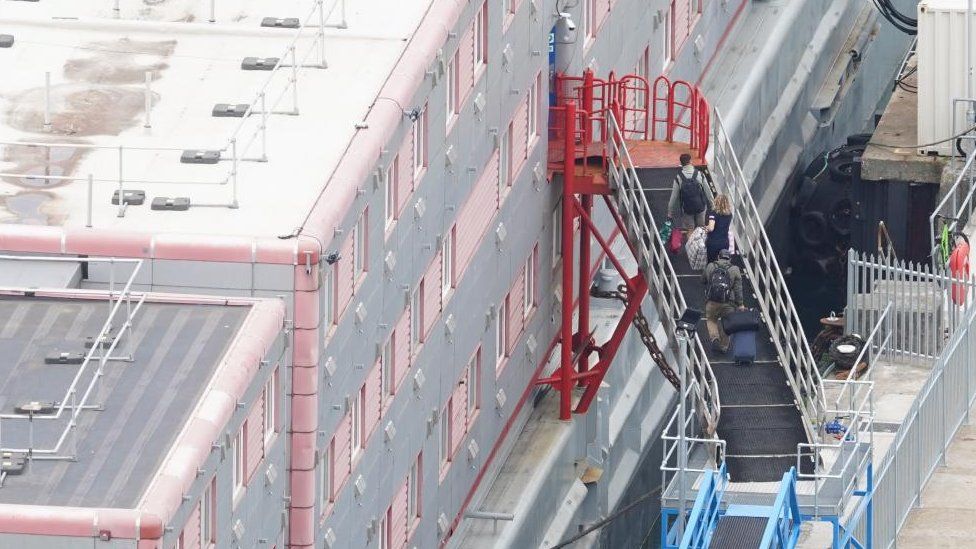ARTICLE AD BOX
 Image source, PA Media
Image source, PA Media
By Stephen Stafford & Matthew Davis
BBC News
A "significant" number of asylum seekers who had refused to board the Bibby Stockholm have now changed their minds about moving to the barge, the immigration minister has told the BBC.
"A significant number moved yesterday, I suspect more will move in the coming days," Robert Jenrick said.
Asylum seekers already on the vessel have been describing the conditions.
One told the BBC it was like a prison without the room to accommodate up to 500 people, as the government plans.
Mr Jenrick said the numbers aboard the vessel - moored at Portland Port in Dorset - would increase "in the coming days" from the initial group of about 20, but no date had been set for reaching full capacity.
"We have written to those individuals who have so far declined to travel and, as I understand it, a significant proportion of them have already changed their minds and agreed to move," he said.
Asylum seekers have been told refusing to board the Bibby Stockholm barge could result in them no longer receiving government support.
Mr Jenrick said there was "not a menu of options" for those seeking state-funded help.
"We've got to be fair to the tax payers as well as decent and compassionate to the individuals concerns.
"If you choose to turn down perfectly acceptable accommodation such as the barge, we give those people due notice and if they don't change their mind, we do withdraw their accommodation support."
He said those affected would have to "look after themselves".
Bibby Stockholm is the flagship of the government's latest plan to "stop the boats" and deter dangerous Channel crossings by migrants. Men aged 18-65 will live on the vessel while they await the outcome of asylum applications.
The Care4Calais charity said on Monday it was providing legal support to a 20 asylum seekers who had refused to move to Portland and were challenging the decision.
"Housing people fleeing threats and persecution on an overcrowded barge is appalling, and in itself likely to cause extreme distress," it said.
An Afghan asylum seeker aboard the barge, whom the BBC is not identifying, said: "The sound of locks and security checks gives me the feeling of entering Alcatraz prison.
"My roommate panicked in the middle of the night and felt like he was drowning. There are people among us who have been given heavy drugs for depression by the doctor here."
He said he had been given a small room, and the dining hall had capacity for fewer than 150 people.
"Like a prison, it [the barge] has entrance and exit gates, and at some specific hours, we have to take a bus, and after driving a long distance, we go to a place where we can walk. We feel very bad," the man added.
Image source, PA Media
Image caption,There has been considerable local opposition to the barge coming to Portland
The 222-room, three-storey barge arrived in Portland Port more than three weeks ago, chartered by the government to reduce what it says is the £6m-a-day cost of placing asylum seekers in hotels.
Ministers say it is safe, despite safety warnings from the Fire Brigades Union (FBU) which has raised concerns over narrow exits and possible overcrowding.
It includes catering, a TV room, a multi-faith prayer room and a gym.
Migrants will be free to leave on hourly buses to Weymouth and Portland, although they are encouraged to return by 23:00 each night.
The Home Office has said the barge occupants will undergo security screening and Dorset Police has said it does not expect any impact on the local community.
Follow BBC South on Facebook, Twitter, or Instagram. Send your story ideas to south.newsonline@bbc.co.uk.

 1 year ago
74
1 year ago
74








 English (US) ·
English (US) ·